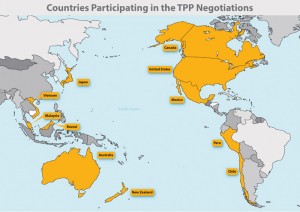The Trans Pacific Partnership (TPP) free trade agreement has generated its fair share of attention in the press as of late, as lawmakers in the U.S. and the 11 Pacific Rim partner countries debate its various provisions. Perhaps lesser known to the general public – but of central importance to intellectual property lawyers – is the discord that the agreement has engendered among partner nations over intellectual property protections.
The U.S. Congress delayed the pain of dealing with the perennial lack of progress in patent reform and its most virulent negative externality – patent trolling – by putting off consideration of the Innovation Act until September. With the Trans Pacific Partnership, however, Congress has had no such luck in avoiding the contentious issue of patent reform this summer, as it has found itself often at loggerheads with most partner countries over central intellectual property provisions contained in the initial reading of this controversial free trade act. And whereas the debate within the U.S. Congress over patent reform vis-a-vis the Innovation Act will undoubtedly take the usual form of a game of partisan checkers, the battle over how to define intellectual property protection in the TPP – with the multiple competing interests of the 12 partner nations – is more likely to resemble the 3D chess game popularized by Star Trek’s Mr. Spock.
Trans Pacific Partnership | What are the main issues of the debate?

In their ideal form, SPFs can serve as clearinghouses where related patent licenses could be bundled and be available for purchase by individuals or companies. SPFs in this form can thus serve as a great tool for streamlining the often daunting process of negotiating international patent law for start-ups and small businesses, and thus could be a great spur for innovation and efficiency. However, in practical terms, SPFs have become defined in most cases as “government-funded organizations that acquire and leverage patents in pursuit of national economic objectives”.
The two most important examples of the trend of SPFs operating as instruments of economic nationalism instead of serving as pools of knowledge and efficiency are in regards to the practice of retaliatory lawsuits and discriminatory licensing. The latter occurs when an SPF demands an inflated patent license fee from a competing foreign company. SPF-sponsored retaliatory lawsuits often occur when a domestic company is hit with a patent suit by a competitor of another TPP member. Frivolous or not, a SPF of the offended country often will respond with multiple lawsuits of its own against the competitor. As a result many of the worst offenders have been labeled with the pejorative title of Government-Sponsored Patent Trolls (GSPT). In both cases, the U.S. has found itself essentially alone in pressing for corrective reform. Perhaps the most powerful symbol of this difference in trade philosophy is the fact that the U.S. is the only TPP member country not to have government sponsored SPFs.

Any attempts to compromise on this point by U.S. lawmakers may lead certain key Republicans – most likely lead by Senate Finance Committee Chairman Orrin Hatch – to withdraw their support for the TPP, potentially thwarting the passage of the agreement. So whether this circle can be squared in a satisfactory way by negotiators during the TPP deliberations is an essential indicator not only of what type of agreement will be passed, but whether it will be passed at all. Where is Leonard Nimoy when his country needs him most?
Learn more about our Legal Translation and our Patent Translation services!
About Language Connections:
Language Connections is one of the top language service companies in the US. Over the last 30 years, we’ve focused on providing the best business translation services, interpreting services, as well as interpreter training and customized language training programs. In addition to top-tier corporate language training, we offer certified corporate interpreters and professional business translation services in 200+ languages. Our network includes linguists with backgrounds in all major industries. They’re ready to meet your needs, whether they’re for technical translation services, legal translation, government translation services, international development translation services, education translation services, life sciences translation, or something else. Reach out to us today for a free quote on our cost-efficient and timely translation services, interpreters, or other linguistic services.
Language Connections Inc.
2001 Beacon Street, Suite 105,
Boston, MA 02135
Phone: +1-617-731-3510
Email: service@languageconnections.com

